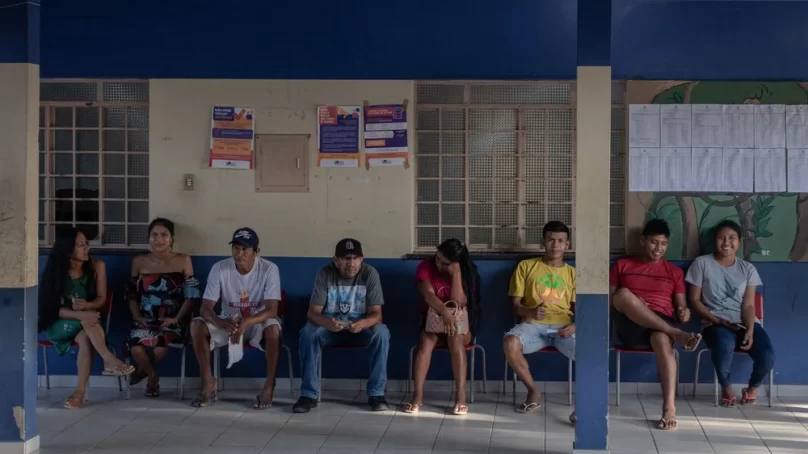
Eight years after Brazil dropped off of the World Food Programme’s Hunger Map, food insecurity is again becoming a problem. A post-pandemic survey conducted by the Brazilian Research Network on Food and Nutrition Sovereignty and Security shows that 58.7 per cent of Brazilians are facing some level of hunger.
People of colour are worse hit, with 65 per cent of households where the primary income earner is Black or brown, not having enough to eat.
The end of the government’s pandemic assistance a year ago led to what Rio’s Centre for Social Policies aptly termed “the poverty rollercoaster”: The percentage of Brazilians experiencing poverty returned to its peak at over 13 per cent, set at the start of the pandemic.
“Hunger is not only related to a crisis in employment or to low income levels,” Antônio Claret, an expert on poverty reduction policies in Brazil, says. “It is about a dismantling of public policies for food security.”
The next government will have to look at ways to create new programmes to avoid that rollercoaster effect, Claret noted.
“The market alone cannot solve the problem – especially now,” he said. “We need policies for family farming, better food at schools, and social assistance. This is not just a challenge for the next president, but for the next generations.”
While Bolsonaro has at times denied the existence of hunger in the country, his government did start Auxílio Brasil, to “integrate into one programme several public policies for social assistance, health, education, employment, and income.”
Yet even among families who have received that assistance, there has been an increase in moderate and severe food insecurity.
The day after the first round of voting, Bolsonaro’s government announced that emergency aid payments would be advanced by seven days – ensuring they were issued a week before the run-off instead of afterwards, prompting accusations from the opposition that this was a ploy to attract votes from the most vulnerable.
It’s not only in the Indigenous territories that the Brazilian government has been accused of supporting violent campaigns. During incumbent Jair Bolsonaro’s tenure, the government has conducted near-daily police raids in favelas, citing the presence of criminal gangs.
Even during the pandemic – and in spite of rulings from the Supreme Court restricting such operations – the states of Bahia, Ceará, Pernambucano, Rio de Janeiro, and São Paulo collectively registered a police incursion every hour, and a death every 10 hours.
While the war on drugs and gun violence are usually used as justifications for such actions, less than 26% of raids resulted in the apprehension of narcotics, and only in 15 per cent of cases were weapons seized.
According to the Brazilian Forum of Public Safety, police killed over 6,100 people in 2021. Since 2013, when the NGO first started monitoring, at least 43,000 victims have died as a result of the actions of civil and military police, its 2022 annual report said.
“When Bolsonaro became president, the state security forces started to play a much more prominent role,” said Patrícia Oliveira, a member of the Network of Mothers and Relatives of Victims of State Terrorism.
“As human rights activists, we cannot vote for someone who speaks in support of torture,” Oliveira says. “State violence has always been a reality in Brazil. But, under Bolsonaro, the security forces and the president himself promote and reinforce this violence.”
Luis da Silva Lula was in power when Maria Dalva Correia da Silva lost her 19-year-old son during a police operation in Rio de Janeiro’s Borel favela in 2003. But when she casts her vote for the second time this year, on Sunday October 30, she will once again type 13 – the number of Lula’s party – on the electronic ballots.
Dalva says she has witnessed a growing impunity for police violence under Bolsonaro, and at least Lula ordered an investigation into her son’s death as part of an inquiry by the Human Rights Commission.
Ahead of a recent review of Brazil’s record at the UN Human Rights Council, Human Rights Watch reported that Bolsonaro “encouraged police violence and proposed legislative initiatives that would make it more difficult to hold police officers accountable [for abuses].”
HRW recommended that authorities devise a plan to curb police violence and adopt new protocols that follow international standards to investigate cases of police abuse.
While the number of deaths resulting from police actions fell in 2021 by 4.2 per cent, deaths resulting from police actions still represent 12.9 per cent of all intentional killings. According to the Brazilian Forum of Public Safety, these are indications that abuses and executions remain a common practice in some police institutions.
“These actions take place with the endorsement of a society that believes ‘a good criminal is a dead criminal’,” said Dalva. “Today, we fight for the memory and dignity of our deceased; but we also fight to prevent more young people from dying.”
- The New Humanitarian report











